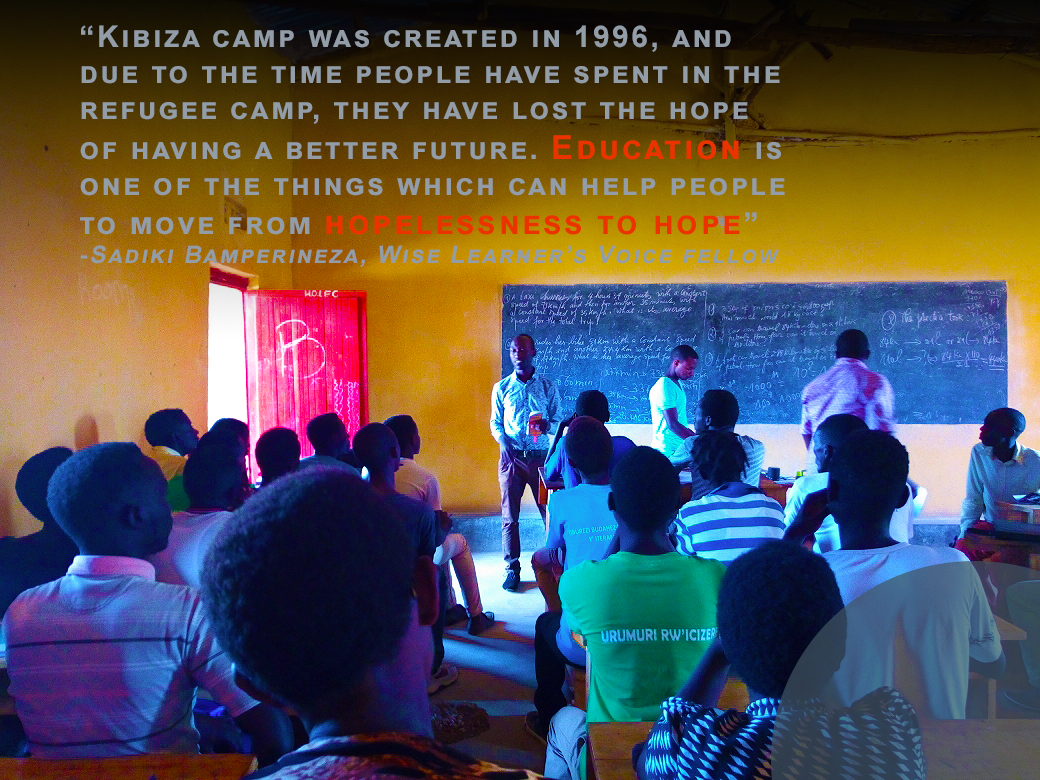Kiziba is one of the ancient Congolese Refugee Camps in Rwanda. It is located in the western part of the country, where it takes three hours of driving from Kigali, the capital city. This refugee camp is populated by more than 1700 people from different parts of the Democratic Republic of Congo, mainly in the Kivus. This camp was created in 1996, and due to the time people have spent in the refugee camp, they have lost the hope of having a better future. Education is one of the things which can help people to move from hopelessness to hope. Education in this refugee camp is structured from the nursing school (early childhood) up to university.
I have lived 22 years in this refugee camp, and I have completed my bachelor’s degree at the same place. From my observations, there is a big gap between the number of the students who attend university and those who finish high school. Statistics show that more than 200 young refugees in Kiziba are able to finish high school. However, many are not able to attend university after graduation due to funding. In fact, the low enrollment numbers are apparent through Kepler Kiziba University and the DAFI program. Kepler Kiziba University enrolls 30 students (15 girls and 15 boys) while the UNHCR funded scholarship, DAFI, enrolls less than 10 students outside of the camp in national universities. Moreover, when Kepler publishes an online application portal, it receives hundreds of refugee applicants but its ability to enroll all of them is still low.

Kepler University provides a blended learning program and helps refugee students to earn U.S. accredited degrees from Southern New Hampshire University. It has a limited number of majors because until today, Kepler has provided a Bachelor of Arts (BA) in Communications with a concentration in Business, a BA in Management with a concentration in Insurance, BA in Health Care in Global Perspective and BA in management with a concentration in Logistics.
The need for an increased aid to higher education access does not end at the Kiziba Refugee camp. Programs like Kepler are also needed in other refugee camps in Rwanda’s six refugee camps with more than 150,000 refugees. Kepler’s current structure alone is not sufficient for making higher education accessible for all refugees in Rwanda.
In 2017, I joined the WISE Learners’ Voice Program in order to learn how to create a social project to promote education in refugee and forced immigration concepts. Through this Fellowship, I participated in the World Innovation Summit for education and learned about creating social education-based projects. In this role, I worked with a WISE Fellow Charlotte Evans, to develop a project based on the idea that there is an information crisis in refugee education where refugees do not get accurate information about available educational opportunities or understand the legal requirements for them to have scholarships and some academic fellowships. Due to this problem we envisioned an advising model for helping refugees surpass those hurdles and be able to reach their dreams through education.
We have observed that there is a need of awareness and provision of information to the refugees in Rwanda so that they can be aware of the available opportunities around that world and try their chance to see if they can put their dreams into realization. For example, taking into consideration my own experience, I have spent 5 years in a refugee camp after finishing my high school without having any idea about any available opportunities for higher education for refugees in Rwanda.
We aim to develop Reach Higher, an advising model for refugees with contextualized data for Rwanda. This advising model can be specific with provision of information about available opportunities for refugees higher education, eligibility criteria and an understanding of international laws which can be implicated in the implementation of this project.
In order to make Reach Higher Project a reality, we have partnered with ITEME Bridge Program funded by SNHU and Kepler Program in Rwanda. With ITEME Bridge Program, we will work together to find the database of opportunities for refugees’ higher education in Rwanda. Moreover, we are building a partnership with many ground partners in Rwanda such as UNHCR, Ministry of Disaster Management and Refugee in Rwanda and World Vision. Furthermore, we have partnered with partners specialized in the field of academic advising such as NAFA and International ACAC. These partners will help us in the development of the advising curriculum for refugees which will be used by Reach Higher.
Reach Higher aims to increase partnership with potential partners who can help in this field of refugee advising and promoting higher education for refugees.
-Written by Sadiki Bamperineza, WISE Learner's Voice Fellow.
Learn more about Mr. Bamperineza

